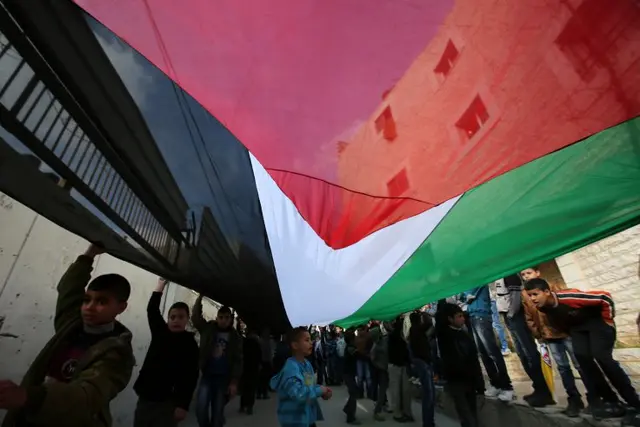Palestinians are more pessimistic to reach a permanent peace with Israel in 2016 amid ongoing violent tension since October, an absence of a political horizon and more than eight years of internal split.
Sha'ban Adas, a Gaza young man graduated from college majoring media and communication said there are no signs for a significant improvement in the year 2016, mainly after the ties with Israel deteriorated.
He said that the balances of powers of the conflicts with Israel are not going towards the Palestinians' interests. Moreover, the internal split weakens their position and gives Israel more power.
An internal Palestinian split between Islamic Hamas movement and Palestinian President Mahmoud Abbas' Fatah party has been going on since 2007, when Hamas violently seized the control of the Gaza Strip.
Several agreements, deals and understandings had been reached between the two rivals, including an agreement to form a consensus technocrat government in June 2014 in order to put an end to the internal split. However, feuds between them remained unresolved.
Rima Abu Laban, a young Palestinian woman from the West Bank city of Ramallah expressed deep concern for this year. According to her opinion, there will be no positive change in the Palestinian position without ending the internal split.
The 28-year-old woman added that the vision for the future of the Palestinian society "is vague," with the current situation pushing the people towards more pessimism concerning what is coming next.
"The hope to see a successful peace process has become dim especially for the young generation because it is clear that Israel doesn't want peace and keeps its operations of killing and its expansion of settlements," said Abu Laban.
The Palestinian health ministry said 178 Palestinian were killed during conflict with Israel in 2015, including 144 people died in the ongoing flaring wave of tension that broke out in early October.
Islamic Hamas movement and other factions called this wave of violence an "Intifada" or Uprising against Israel, while the Palestinian government called it a popular blow and holds Israel responsible for it.
Lina Hasouni, a woman from the West Bank city of Nablus said all Palestinians hope to witness the establishment of an independent Palestinian state and the end of the Israeli military occupation in the new year. However, she said "the opportunities for achieving the goals are still very far away."
"The major reason for weakness is the weakness of an Arab stance or position that backs the Palestinian cause, and also the absence of the popular and official support to our people who are struggling against Israel alone," said Hasouni.
A recently published poll showed that 60 percent of the Palestinians are pessimistic towards establishing an independent Palestinian state, while 32 percent people said they are optimistic and 8 percent said they don't know.
Palestinians also hope the new year may bring them real changes to the social and economical situation.
Kafreem Mriesh, an employee from Gaza in his mid 30s said he never stops thinking about changing the bitter reality in Gaza, mainly opening the closed crossing points and reducing the high rates of poverty and unemployment.
Ahmed Sultan, a fisherman from Gaza, shared views with Mriesh and said that his dream is to see an end to the Israeli tight restriction for more than 3,000 Gaza fishermen in the Gaza Strip, limiting their fishing in an area of only six miles.
The Gaza Strip populations have been suffering high rates of poverty and unemployment for many years because Israel imposes a tight blockade on the enclave since 2007 while waging three large- scale wars on the coastal enclave in the past eight years.
Om Khamis al-Kheisi, a 50-year-old woman from Gaza hoped that the new year would help her reconstruct her home which was destroyed in the 2014 Gaza. During the conflict, tens of thousands of homes were destroyed.
Hafez Barghouti, a Palestinian journalist and writer wrote a column published in one of the local newspapers, saying that "I call on the Palestinians to be optimistic and not pessimistic because pessimism is half death."
Yet George Jackman, chairman of the Palestinian Institution for Democratic Studies in Ramallah said the situation on the ground with Israel is unstable. "I don't see that there will be real solutions soon. Therefore there are no signs for optimism."
 简体中文
简体中文

